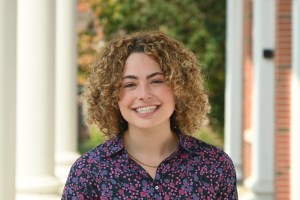Michael Wear, former White House staffer who is now founder, president and CEO of the Center for Christianity and Public Life nonprofit, spoke to a small audience of Wheaton College students, faculty, staff and locals in Blanchard Hall on Tuesday, Feb. 20 at 7 p.m.
The event was hosted by the Wheaton College Center for Applied Christian Ethics (CACE); the Center for Faith, Politics and Economics (FPE); the Christian formation and ministry department; and the politics and international relations department. Vince Bacote, professor of theology and director of CACE, gave opening remarks followed by a short introduction from Wear about his new book, “The Spirit of Our Politics.”
Wear directed faith outreach during former President Barack Obama’s 2012 re-election campaign and managed the White House’s engagement with religious issues during the beginning of Obama’s second term. Wear’s work focused on adoption and anti-human trafficking policy, which he linked to his personal experience as an adopted child and his Christian belief. Through his work in and out of the White House, Wear has highlighted evangelical Christian leaders and vocalized many of their interests to different government entities.
“A lot of people say, ‘because you were working in the White House, it must have really soured you on the church,’” he told the Record. “And I say, ‘no, I left the White House more hopeful about our country and about the church than I was when I went in.’”
At Tuesday’s talk, Wear discussed the “practical atheism” he feels many Christians live with when it comes to their public and civic lives. He said Christians sometimes don’t trust that their religion has the answers to political problems. Some Christians could be accustomed to faith in politics as either “useless or something to be used,” Wear said.
“It would be not only insufficient but also inaccurate for Christians to blame outside forces, secularism, liberalism, political correctness, an antagonistic popular culture, etc. for this development,” he said. “Rather, this privatized, domesticated view developed in America with both the explicit and tacit contributions of Christians.”
In his talk and the subsequent Q&A session with Amy Black, professor of political science, Wear, who is a registered Democrat, encouraged Christians not to check out from political engagement, but rather to demand better of political parties and elected officials. Being in a political party, Wear said, should be an opportunity to make that party work for and better represent its members, not the other way around.
“I’m not there to earn your plaudits,” he said, referring to citizens’ relationships with elected officials. “I’m showing up to change you.”
Bacote said Wear had reached out to the CACE, which had hosted him at least twice before, and the political science and international relations department to announce his new book before its Jan. 23 release. The various academic departments then joined together to invite Wear to campus to speak and promote the book.
Bacote said he appreciated Wear’s comments in the book and the talk emphasizing spiritual formation as a way to be better political citizens.
“Among the most significant takeaways were that we need to think more about the kind of person we are in our political engagement and that our participation in politics ought not to be mainly about short term effects but long term efforts to help contribute to the penultimate goods that can emerge from politics,” Bacote said.
In his lecture and responses to audience questions, Wear lamented partisanship among Christians, citing heightened political divisions among churches and even families. At one point, he shared a story about a woman who was trying to mend a relationship with her daughter that had been strained by their differing political views. Stories like these, he said, have become increasingly common as citizens, including Christians, hyperfocus on their politics as part of their identity.
“If you’re aiming for the outcome,” said Wear, “you’re going to miss the crux of it.”
Wear was optimistic that Christians can become politically involved with ways and words that are consistent with their faith. The church’s history, he told the Record, is full of examples of people who maintained their faith while using politics for the good of the world. Christians need to recognize that their faith compels them to be politically active in a way that is good for the whole community.
“I think the challenge has been that if we treat politics as this area of life in which Christianity doesn’t hold up, then we starve ourselves of the resources that are available to doing that,” said Wear.
Ari Escareño, a senior international relations major, attended the event because of her interest in different perspectives on the intersection of faith and politics. She told the Record that she has seen Christians go to extremes, where their faith either determines everything about their political life or nothing.
“It was very refreshing to hear what I thought was a very clear relationship between the two, at least on a personal level,” she said.


